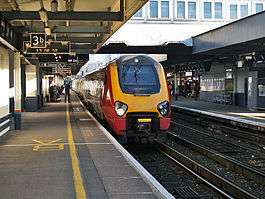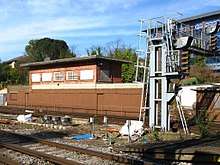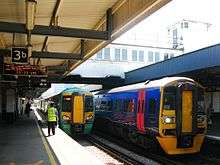Southampton Central railway station
Coordinates: 50°54′27″N 1°24′51″W / 50.9075°N 1.4141°W
| Southampton Central | |
|---|---|
 | |
| Location | |
| Place | Southampton City Centre |
| Local authority | City of Southampton |
| Grid reference | SU412121 |
| Operations | |
| Station code | SOU |
| Managed by | South Western Railway |
| Number of platforms | 4 |
| DfT category | B |
|
Live arrivals/departures, station information and onward connections from National Rail Enquiries | |
| Annual rail passenger usage* | |
| 2012/13 |
|
| 2013/14 |
|
| 2014/15 |
|
| 2015/16 |
|
| 2016/17 |
|
| History | |
| 1 November 1895 | Opened (Southampton West) |
| 1934–1935 | Enlarged |
| 7 July 1935 | Renamed (Southampton Central) |
| 10 July 1967 | Renamed (Southampton) |
| 29 May 1994[1] | Renamed (Southampton Central) |
| National Rail – UK railway stations | |
| * Annual estimated passenger usage based on sales of tickets in stated financial year(s) which end or originate at Southampton Central from Office of Rail and Road statistics. Methodology may vary year on year. | |
|
| |
Southampton Central railway station is a main line station serving the city of Southampton in Hampshire, southern England. It is on the Wessex Main Line, the South Western Main Line and the West Coastway Line. It is 79 miles 19 chains (127.5 km) measured from London Waterloo.[note 1]
The station is managed by South Western Railway who operate the majority of services, including frequent trains to London Waterloo, Bournemouth and Portsmouth Harbour. Other operators are CrossCountry (providing services to Oxford, Birmingham New Street, Manchester Piccadilly and Newcastle), Great Western Railway (to Bristol Temple Meads and Cardiff Central) and Southern, which links Southampton to London Victoria, East Croydon, Gatwick Airport and Brighton.
History

Southampton Central station was opened as Southampton West in 1895, to replace the smaller nearby West End station (originally named Blechynden when it opened in 1847).[2] The station was on the seafront, specifically the stretch of water known as West Bay, with the water reaching right up to the southern edge of the platforms at high tide. A series of land reclamation projects to expand the docks, largely funded by the London and South Western Railway, culminated in the building of the vast "New Docks" (now Western Docks) between 1927 and 1934, which led to all of West Bay being reclaimed and the station becoming landlocked. The new land and the demand for new lines allowed the station to be enlarged and redeveloped in 1934–1935 (from two platforms to four), and it became Southampton Central.[3] The new station buildings were largely constructed from concrete.[4]
An air raid on 23 November 1940 damaged the buildings alongside platform one.[4] The station was hit by two German parachute mines on 22 July 1941 which destroyed the ticket hall on platform four and damaged the island platform.[4]
In preparation for the closure of Southern Terminus station near the docks in 1966, alterations were made to the station's parcel handling facilities to allow it to handle increased volume.[5] In 1967, soon after the closure of Southampton Terminus, the station was rebuilt, losing its clocktower which was replaced with an office block.[5] At this point it was renamed Southampton,[5] although in 1994 was once again renamed to Southampton Central.[6]
A partnership between Network Rail, South West Trains and Southampton City Council saw a £3million investment in the refurbishment of the station and improved passenger facilities which was completed at the end of 2011.[7]
It was announced in late 2011 that Southampton City Council has plans to rebuild the whole station under the Western Gateway project. The project costing £200 million will see a new station with 10 platforms, and over 25,000sq metres of retail and office space. This project is part of the Future Southampton programme, set to be complete by 2025.[8]
Description
All the platforms are split into two sections, A at the east and B at the west, allowing two services to occupy a platform at the same time, or to allow for trains dividing into two portions or attaching to make one train. This dual use occurs throughout the day on platforms 2 and 3, and in peak hours on platforms 1 and 4.
Platforms 1 and 4 are side platforms facing the fast lines. These platforms accommodate CrossCountry's Manchester to Bournemouth services (as well as an extension of the Reading to Newcastle service); Great Western Railway's Cardiff to Portsmouth route; and fast services to London Waterloo operated by South Western Railway.
Platforms 2 and 3 are on an island, facing the slow lines. On these platforms call services on South Western Railway's Romsey to Salisbury local service, its service to Portsmouth & Southsea, and its stopping services to London Waterloo. Southern services to London Victoria and Brighton also start from these platforms.
There is also an ex-Red Star Parcels bay on the Bournemouth end of platform 4. Previously numbered as platform 5, stopping services to Brockenhurst used this platform, but the platform can no longer be used for passenger services due to the lack of a proper starting signal. It is now used for the stabling of spare units. A number of goods loops are located a short distance away allowing terminating trains to clear the platforms for through services if required, and also to allow passenger services to pass freight trains.
Southampton Central houses both the South Western Railway head office and a British Transport Police station in Overline House on the up side, with street access from Blechynden Terrace.
Services
Rail

Southampton Central has three trains an hour to London Waterloo. Two of these take approximately 1 h 20 min while the Poole stopping service takes approximately 1 h 40 min (being overtaken by the express service at Eastleigh).
Romsey can be reached from Southampton Central using trains departing in both directions, by South Western Railway via Chandler's Ford in the up direction and by South Western Railway and Great Western Railway via Redbridge in the down.
At the station, South Western Railway offer the following in their normal Monday to Friday off-peak service pattern:[9]
- 3 trains per hour to London Waterloo
- 2 trains per hour to Weymouth
- 1 train per hour to Poole (Stopping Service)
- 1 train per hour to Portsmouth and Southsea/Portsmouth Harbour (Stopping Service)
- 1 train per hour to Salisbury via Romsey
- 1 train per hour to Romsey via Chandler's Ford
Southern offer the following in their normal Monday to Friday off-peak service pattern:[10]
- 1 train per hour to Brighton
- 1 train per hour to London Victoria
Great Western Railway offer the following in their normal Monday to Friday off-peak service pattern:[11]
- 1 train per hour to Portsmouth Harbour
- 1 train per hour to Cardiff Central
- 1 train per day to Brighton
- 3 trains per day to Great Malvern
CrossCountry offer the following in their normal Monday to Friday off-peak service pattern:[12]
- 1 train per hour to Bournemouth
- 1 train per hour to Manchester Piccadilly
- 1 train per 2 hours to Newcastle
| Preceding station | Following station | |||
|---|---|---|---|---|
| Fareham | Great Western Railway Portsmouth Harbour – Cardiff Central |
Romsey | ||
| Great Western Railway Brighton-Great Malvern |
||||
| Southampton Airport (Parkway) or Winchester |
CrossCountry Bournemouth-Manchester |
Brockenhurst | ||
| CrossCountry Southampton-Newcastle/Edinburgh (via Doncaster) |
Terminus | |||
| Southampton Airport Parkway |
South Western Railway London – Weymouth express services |
Brockenhurst or Bournemouth | ||
| South Western Railway London – Weymouth semi-fast services |
Brockenhurst | |||
| South Western Railway London – Poole stopping service |
Totton or Terminus | |||
| St Denys | South Western Railway Romsey to Salisbury |
Millbrook | ||
| South Western Railway Portsmouth – Southampton |
Terminus | |||
| Swanwick or St Denys or Woolston |
Southern London Victoria – Southampton (via Horsham) |
Terminus | ||
| Swanwick or Eastleigh |
Southern Brighton – Southampton |
Terminus | ||
On 9 December 2007, a number of changes were made to South West Trains, First Great Western and Southern services. The Waterloo to Southampton Central stopping service was extended to Poole, replacing in part the former Brockenhurst to Wareham stopping service. The former Poole train was extended to Weymouth.
The Totton to Romsey shuttle and the Salisbury to Southampton Central portion of the First Great Western Westbury to Southampton Central service were replaced by a South West Trains Salisbury to Romsey via Southampton Central and Chandlers Ford service, which calls at Romsey twice on its journey.[13][14] Southern introduced a new service from Southampton Central to Brighton, and the service to London Victoria now runs via Horsham rather than via Hove.
In December 2008, CrossCountry launched its new timetable with most trains operating between Bournemouth and Manchester Piccadilly, with one service originating at Nottingham and one service on Saturdays terminating at Newcastle.[15] During a short period in the summer, there is also a single service on Saturdays to Leeds. As of December 2010 an hourly CrossCountry train runs from Bournemouth to Manchester Piccadilly, via Coventry, calling at Southampton Central. There are also around 6 trains per day in each direction on the Reading to Newcastle route, via Doncaster, which was extended to Southampton Central.
There are also select CrossCountry services to Scotland, mostly to Edinburgh Waverley.
Bus
The station has a QuayConnect shuttle service that links the station to the city centre and on to Town Quay, for the Isle of Wight Red Funnel and Hythe ferries. This service is operated by Bluestar and departs from the Weymouth (south) side of the station along with Unilink's U1 service, which runs between the National Oceanography Centre, Southampton and Southampton Airport via the University of Southampton's Highfield Campus. The now defunct City Clipper service also served this side, linking a number of places in Southampton City Centre to the station. This side of the station benefits from a turning circle allowing buses to come in and out.
Bus services operated by Bluestar, First Hampshire & Dorset, Stagecoach in Hampshire and Salisbury Reds use stops on the London (north) side of the station, linking the station to several areas of the city as well as locations including Salisbury, Totton and Romsey.
Notes
References
| Wikimedia Commons has media related to Southampton Central railway station. |
- ↑ Butt, R.V.J. (1995). The Directory of Railway Stations, Patrick Stephens Ltd, Sparkford, ISBN 1-85260-508-1, p. 214.
- ↑ Moody, Bert (1997). Southampton's Railways. Atlantic Publishers. p. 63. ISBN 0906899788.
- ↑ Moody, Bert (1997). Southampton's Railways. Atlantic Publishers. p. 67. ISBN 0906899788.
- 1 2 3 Moody, Bert (1997). Southampton's Railways. Atlantic Publishers. pp. 69–71. ISBN 0906899788.
- 1 2 3 Moody, Bert (1997). Southampton's Railways. Atlantic Publishers. p. 74. ISBN 0906899788.
- ↑ Moody, Bert (1997). Southampton's Railways. Atlantic Publishers. p. 144. ISBN 0906899788.
- ↑ "Rail passengers to benefit from improvements to Southampton Central station". Stagecoach Group plc. August 2010. Retrieved 8 September 2010.
- ↑ Southampton City Council – Station Quarter and Western Gateway Archived 29 June 2012 at the Wayback Machine.
- ↑ GB eNRT 2015-16 Edition, Table 158 (Network Rail)
- ↑ GB eNRT 2015-16 Edition, Table 165 (Network Rail)
- ↑ GB eNRT 2015-16 Edition, Table 123 (Network Rail)
- ↑ GB eNRT 2015-16 Edition, Table 51 (Network Rail)
- ↑ Timetable changes for December – South West Trains
- ↑ "First Great Western – Draft December 07 to May 08 Timetable"
- ↑ CrossCountry December 2008 timetable